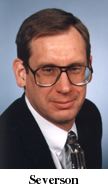Patenting genes and other discoveries won't harm the free exchange of scientific information, Cornell expert tells Congress
By Bill Steele

ITHACA, N.Y. -- The patenting of genes, or other scientific discoveries, need not interfere with the free exchange of information among scientists, and it is often the best way to bring the benefits of discoveries to the public, a Cornell University patent and licensing manager will tell Congress today (Thursday, July 13).
James A. Severson, president of the Cornell Research Foundation, will testify before the House Judiciary Committee's Subcommittee on Courts and Intellectual Property, which is considering the question of whether or not it should be permissible to patent genes. The mission of the Cornell Research Foundation, a non-profit subsidiary of Cornell University, is to identify, protect and license for commercial development inventions made at the university. Severson will speak in his capacity as the president of the Association of University Technology Managers (AUTM(r)). He is appearing as part of a panel of witnesses that included representatives of commercial biotechnology companies, specialists in intellectual property law, cancer researchers and a bioethicist.
Patenting and licensing a discovery, Severson says in his prepared statement, is often the best way to ensure that a discovery will be put to use, and it provides an incentive for researchers. He pointed to the Patents and Trademark Act of 1980 (also known as the Bayh-Dole Act), which granted universities the ability to elect to retain title to inventions resulting from federally financed research. Prior to this act, the government retained title to such inventions, and while commercial interests could license the inventions, the process was cumbersome and few did, Severson says.
Since the act went into effect, he says, the exploitation of inventions made at universities and other non-profit institutions has greatly expanded. He quotes an AUTM survey showing that since the passage of Bayh-Dole the number of annual patent applications by universities doubled to 11,704, the number of licenses that universities have entered into grew three-fold to over 3,600, and in fiscal year 1998, 364 new companies were formed with university technology. For fiscal year 1998, he said, AUTM estimated that university technology transfer activity resulted in $33.5 billion in economic activity, supported 280,000 jobs in the economy and resulted in $7 billion in federal and state tax revenues.
An important issue, Severson says, is whether or not patenting will affect the publication and sharing of research results in academic circles. "In practice," he says, "the pursuit of a patent rarely delays the publication of results." University technology transfer managers work with researchers to secure protection before results are due to be published or presented at public meetings, he said, citing examples from his Cornell experience.
Subsequently, he says, licensing the invention to commercial interests is the best way to spread the benefits of the invention to the public. Often, he points out, discoveries made at universities are very basic and require extensive further development to create useful products.
Transferring research results to the commercial marketplace, he concludes, "is an important way for universities, hospitals, and research institutes to demonstrate the relevance of their research programs, introduce innovation into the commercial sector, and enrich the lives of citizens. These discoveries can be pursued without disrupting the core values of publication and sharing of information, research results, materials, and know-how."
Related World Wide Web sites: The following sites provide additional information on this news release. Some might not be part of the Cornell University community, and Cornell has no control over their content or availability.
-- Cornell Research Foundation, Inc.: http://www.research.cornell.edu/CRF.html
-- The full text of Dr. Severson's statement is available at
http://www.news.cornell.edu/releases/July00/Severson-test.html
Media Contact
Get Cornell news delivered right to your inbox.
Subscribe